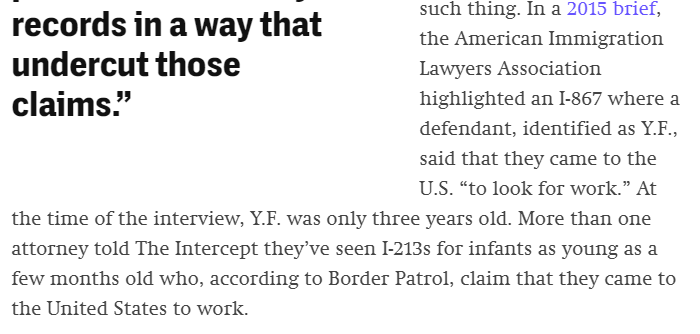Got my first response to a Mendez-Rojas motion, and of course DHS produces a brand new I-213 claiming these folks told CBP they had no fear. This is a common, well-documented trick by CBP to scuttle bona fide asylum claims. And I expect we'll see it in every one of these cases.
That's not conspiracy theory either. The USCIRF, a federal agency that studies international religious freedom, documented CBP's pattern of lying about whether people expressed a fear at the border in this lengthy report in 2016. https://www.uscirf.gov/sites/default/files/Barriers%20To%20Protection.pdf
The USCIRF found that more than half of the time CBP didn't ask the person if they were afraid to return - and in 86.5% of those cases, the officer wrote on the paper that the question was asked and that the person wasn't afraid to return.
USCIRF observed interviewed asylum officers with the USCIS who told them it was a "common occurrence" to have forms generated by CBP state falsely that the person said they weren't afraid to return. And they kept seeing forms with identical answers...
To figure out why, they observed CBP officers conducting initial interviews and found them using templates with questions and answers already filled in. One officer used the pre-filled answers to ask leading questions. Another just cut and paste the answer from the template.
Last year by @jbwashing reviewed I-213s produced through FOIA and interviewed a bunch of attorneys, former officers, and others. His reporting is damning. https://theintercept.com/2019/08/11/border-patrol-asylum-claim/
Both reports reflect that CBP officers intentionally lie on these forms (a) because it makes their job easier (if no fear, they don't have to refer the person to an asylum officer), and (b) because they don't believe in asylum or that people from certain countries deserve it.
Both also contain reports of asylum seekers with documents in hand about what they're fleeing from, only to have CBP take the documents away and never give them back. Making it imminently more difficult for the person to prove their case in court.
Both reports also identify multiple CBP forms I-213 that claim the person only came to the United States to work, even when the person is a toddler.
Since the early 80s, courts have held that these forms are "inherently reliable." The BIA says you can't disprove them with a sworn affidavit. You can only do it with testimony (which you can't provide in a motion to reopen). Matter of Barcenas:
There are exceptions in case law. The lack of an interpreter, the officer's failure to sign the I-213, other proof that the I-213 has bogus information in it. Sometimes those exceptions work. But sometimes they don't. This 7th Circuit opinion is haunting:
This is another example I think of when we talk about how the "system" is "broken." Yes, there is proof that the system wasn't designed to work this way. But it was very much designed to let people make it work this way and get away with it. Which is frankly the same thing.

 Read on Twitter
Read on Twitter







